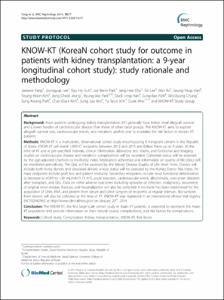KUMEL Repository
1. Journal Papers (연구논문)
1. School of Medicine (의과대학)
Dept. of Internal Medicine (내과학)
KNOW-KT (KoreaN cohort study for outcome in patients with kidney transplantation: a 9-year longitudinal cohort study): study rationale and methodology
- Keimyung Author(s)
- Han, Seung Yeup; Park, Sung Bae
- Department
- Dept. of Internal Medicine (내과학)
- Journal Title
- BMC Nephrology
- Issued Date
- 2014
- Volume
- 15
- Issue
- 1
- Abstract
- Background : Asian patients undergoing kidney transplantation (KT) generally have better renal allograft survival and a lower burden of cardiovascular disease than those of other racial groups. The KNOW-KT aims to explore allograft survival rate, cardiovascular events, and metabolic profiles and to elucidate the risk factors in Korean KT patients.
Methods : KNOW-KT is a multicenter, observational cohort study encompassing 8 transplant centers in the Republic of Korea. KNOW-KT will enroll 1,000 KT recipients between 2012 and 2015 and follow them up to 9 years. At the time of KT and at pre-specified intervals, clinical information, laboratory test results, and functional and imaging studies on cardiovascular disease and metabolic complications will be recorded. Comorbid status will be assessed by the age-adjusted Charlson co-morbidity index. Medication adherence and information on quality of life (QoL) will be monitored periodically. The QoL will be assessed by the Kidney Disease Quality of Life Short Form. Donors will include both living donors and deceased donors whose status will be assessed by the Kidney Donor Risk Index. Primary endpoints include graft loss and patient mortality. Secondary endpoints include renal functional deterioration (a decrease in eGFR to <30 mL/min/1.73 m2), acute rejection, cardiovascular event, albuminuria, new-onset diabetes after transplant, and QoL. Data on other adverse outcomes including episodes of infection, malignancy, recurrence of original renal disease, fracture, and hospitalization will also be collected. A bio-bank has been established for the acquisition of DNA, RNA, and protein from serum and urine samples of recipients at regular intervals. Bio-samples from donors will also be collected at the time of KT. KNOW-KT was registered in an international clinical trial registry (NCT02042963 at http://www.clinicaltrials.gov) on January 20th, 2014.
Conclusion : The KNOW-KT, the first large-scale cohort study in Asian KT patients, is expected to represent the Asian KT population and provide information on their natural course, complications, and risk factors for complications.
Keywords : Cohort study – Complication – Kidney transplantation – KNOW-KT – Risk factor
- Publisher
- School of Medicine
- Citation
- Jaeseok Yang et al. (2014). KNOW-KT (KoreaN cohort study for outcome in
patients with kidney transplantation: a 9-year
longitudinal cohort study): study rationale and
methodology. BMC Nephrology, 15(1), 77–77. doi: 10.1186/1471-2369-15-77
- Type
- Article
- ISSN
- 1471-2369
- Appears in Collections:
- 1. School of Medicine (의과대학) > Dept. of Internal Medicine (내과학)
- 파일 목록
-
-
Download
 oak-aaa-00671.pdf
기타 데이터 / 157.08 kB / Adobe PDF
oak-aaa-00671.pdf
기타 데이터 / 157.08 kB / Adobe PDF
-
Items in Repository are protected by copyright, with all rights reserved, unless otherwise indicated.